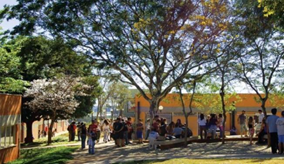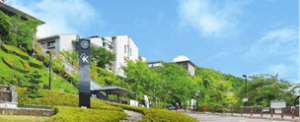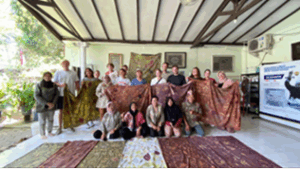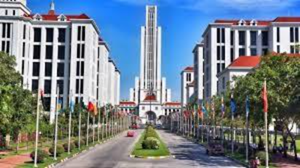Please note: Only a limited number of spots are available in this minor. Japan is currently not available anymore.
Doing Business in High-Growth Markets
Destinations abroad: Indonesia, Japan, Brazil, South India or Thailand
10 weeks Study Abroad & 10 weeks International Business & Culture Courses


Brazil, Indonesia and India belong to the largest emerging markets in the world, Thailand is the 2nd largest economy of Asia and Japan is an important gateway to the large emerging markets in Asia.


In the minor Doing Business in High Growth Markets in Japan, India, Indonesia, Brazil or Thailand you will study in one of those countries at our partner universities during one term (approx. 10 weeks), the remainder of the semester you will spend at HU in Utrecht (NL) for another 3 courses related to International Business. This is a life-changing, unique way to gain understanding of the local economy and life, culture and the language. You will be enrolled in a tailor-made programme for HU, but at the same time you will also be in contact and working with local students.
This minor programme has been created for students who are interested in learning more about high growth markets and international business and who want to broaden their horizons outside Europe for a shorter period, rather than a whole semester. At the same time participation in this minor will certainly have a positive effect on your CV and will increase your employability as many Dutch companies are interested in people with experience in these large, fast-growing economies and experience with international collaboration.
All courses in Japan, India, Indonesia and Brazil, as well as the courses at the HU Institute for International Business Studies will be taught in English. Please see below for more information about the various destinations!
Admission
You can register for this minor as your Study Abroad (through Mobility Online – deadline 31 January) or through the Minor registration in March, but please note that not all places may be still available then (Japan only available via HU Study Abroad).
An intake interview with the minor coordinator to assess your motivation, attitude, expectations as well as the English language skills and to check your study results, is part of the admission process. As all courses are taught in English, you are expected to have attained English language skills at CEFR level B2. If you are unsure about your level, you can do a (free) written and spoken assessment.
Also, you will be asked to give a top 2 or 3 preferred destinations, since acceptance for the minor depends on the available places at the various partner universities.
Please note that sometimes limited spots are available because registration was already possible via the Study Abroad application for HU-students until January 31.
In case there are too many applications, a selection must be made. For this selection the study results (propaedeutic certificate obtained), the diversity of the potential participants and motivation will be considered. In case of equal suitability, lots will be drawn.
You can contact eline.hofman@hu.nl to make an appointment for the intake interview or in case you have questions. Due to the deadlines of some partners, it’s recommendable to contact her at an early stage, in January/February preferably.
An internship is not part of this minor. Nevertheless, you will be studying abroad for approximately 10 weeks.
The Examination Board determines which minors do not have a higher professional education level and/or have an unacceptable overlap with the compulsory curriculum of your own study programme. Check at the page Not allowed minor courses under your institute which minors are not allowed.
Content
International business continues to grow. Companies often start in neighbouring countries, but through technology the world has become smaller, and companies are looking for opportunities all over the globe. After completing this programme, you will be able to assist them in this process. As part of this minor, you will actually study and live in countries that experience high economic growth, allowing for an immersive experience that will boost your knowledge, intercultural skills, confidence and personal growth! During your time at our partner university abroad, you will study local business, culture and language, so that once you return, you know how business is done in these countries, and are able to reflect on your experiences and of course build upon them.
In Term A you will study for about 10 weeks at one of our partner universities: Kyoto Sangyo University (Japan), Facamp, Faculdades de Campinas in Campinas near Sao Paulo (Brazil), Institut Teknologi Sepuluh Nopember (ITS) in Surabaya, Indonesia, Manipal University in Manipal (a coastal city in South East India) or Asumption University in Bangkok (Thailand). All these universities are known for their excellent track record in academics, infrastructure, and research contributions and their standing in the national and international rankings.
At this university you will follow courses about economy, culture, characteristics of doing business, and you will take an intensive introductory course in Japanese, Portuguese or Bahasa, Hindi or Thai. For completion of all courses (Language, Culture, Business) at our partner university you will get in total 15 ECTS. Since academic grading systems differ per country and per university, the grades from our partner universities will not be transferred into HU grades.
During your stay abroad you will also work on some assignments in preparation for the courses in Term B. In Term B you will be back in Utrecht following 3 courses of 5 ECTS provided by our HU International Business programme to strenghten your international business knowledge and intercultural skills.
The first course is Foreign Market Entry Strategy, in which you will learn how to build internationalisation plans for companies aiming to export. This course Foreign Entry Strategy (FES) will give you practical insights, and tools and strategies to internationalize safely, in a strategic, sensible manner.
In Business & Culture you will gain a deeper understanding of the influence of differences in culture on behaviour, values and communication in the respective countries Japan, Indonesia and Brazil and gain insights in current issues in these societies. An in-depth research project about behaviour, values and culture in one of the countries will be carried out, resulting in recommendations for people doing business over there. Next to that, you will explore your own cultural programming and be able to reflect on and illustrate your own global competence.
The third course is Business Project. During this module you will dive into organizational behavioural topics; Organizational Culture, HR, Leadership and Ethics. You will learn more about how companies can make their choices, deal with cultural differences and the challenges of the globalized 21st century. You will be asked to combine your experience abroad with the new obtained knowledge and will dive into challenging, interactive presentations and assignments in group and individual form.
We expect you to actively participate in class (both abroad and at HU); if your active presence in any course is lower than 80% this will influence credits/grades. A tailor-made program is not possible as you will study partially abroad.
Learning objectives
Upon completion of this program, you will be able to:
- Show insight in macro-economic factors and policies in the respective countries;
- Develop an internationalisation plan using demarcated steps, applying relevant knowledge from various business disciplines;
- Analyse group dynamics (knowledge) and work effectively in teams(skills) (collaborate with a variety of other people using elements of effective team dynamics to effectively and appropriately structure teamwork);
- Show an in-depth knowledge and understanding of behaviour, values and business culture in contemporary Indonesia, Japan and Brazil;
- Explain how cultural differences can impact collaboration and is able to turn the gained knowledge into recommendations for appropriate behaviour and communication for persons doing business in these countries.
- Use appropriate verbal and non-verbal communication in an intercultural setting;
- Explain and illustrate his own cultural behaviour and his personal and professional intercultural development (global competence), based on concrete practical examples and theories.
Courses
You will study 10 weeks abroad – in Indonesia, Japan or Brazil – and 10 weeks at HU.
| Course Unit Title | Content | Location | ECTS |
| Doing Business in Indonesia, India, Thailand, Japan or Brazil* *The course offer might slightly differ per partner |
Cultural Studies | Abroad | 5 |
| Language: Bahasa, Japanese, Portuguese, Hindi of Thai | Language Acquisition | Abroad | 5 |
| The Economy of Indonesia, Japan or Brazil* *The course offer might slightly differ per partner |
*The course offer slightly differs per partner: Courses like Economics, International Relations, Foreign Policy, Consumer Behaviour, Organizational Behaviour | Abroad | 5 |
| Foreign Entry Strategy (FES) | Preparing a product launch abroad | HU | 5 |
| Business Project: Organisational Behaviour | Organisational structure, Culture, HRM, Leadership and Business Ethics | HU | 5 |
| Business and Culture | Knowledge on behaviour, values and culture and be able to turn it into recommendations Intercultural personal development | HU | 5 |
Assesment
| Course | Assessment |
| Doing business in Indonesia, Japan or Brazil, India of Thailand | Depending on the country, there will be an exam, assignments or a report to hand in |
| Language: Bahasa, Japanese, Portuguese, Hindi or Thai | Depending on the country, there will be an exam, assignments or a report to hand in |
| Economy of Indonesia, Japan, Brazil, India of Thailand | Depending on the country, there will be an exam, assignments or a report to hand in |
| Foreign Entry Strategy (FES) | Report |
| Business Project: Organisational Behaviour | Portfolio consisting of several assignments |
| Business and Culture | Presentation & Individual assignment |
Literature
The following literature will be discussed during the minor. You will receive a definite reading list before the start of the minor.
Foreign Entry Strategy: Duerr, Edwin. International Marketing & Export Management : University of the West Indies, Pearson Education UK, 2011. ProQuest Ebook Central, link to e-book.
It is a free e-book. Please log in to the library site to get access to the e-book.
Business Project: Articles
Business and Culture: Nunez, Nunez, Popma, Intercultural Sensitivity, (3rd edition, 2014)
Schedule
Teaching days abroad may vary.
Provisional Timelines (based on previous years)
- Indonesia: half of August – end of October
- Thailand: last week August – beginning of November
- Brazil: 1 September – first week of November
- India: first week of September- first week of November
- Japan: first /second week of September – half November
In Term B courses will be taught over 2 or 3 days, but not on Fridays.
With the exception of the first teaching period of the academic year (starting September), the lesson and test schedules are always posted on Mijn Rooster four weeks before the start of each teaching period. The schedule for the first teaching period of the academic year can be found on the site three weeks before the start. The most up-to-date schedule is always visible on Mijn Rooster.
At HU, full-time education may be scheduled between 08:30 and 19:00.
Practicalities and costs
- Since this is a HU minor, students will not have to pay the programme fee, however, as part of the nomination, students do have to pay an administration fee of €50 to the university (a weblink of HU will be made available to complete this payment after nomination to and acceptance by the partner university).
- Besides, some administration costs may be charged by the partner university for field trips and course material (in Brazil, Indonesia around €200).
- Students will have to pay and book their own ticket for outbound and home-bound travel (but can of course plan to travel together with other HU participants).
- The host institution will assist students with visa applications (not needed for Brazil).
- Housing can be easily arranged via the partner university; costs differ per destination E.g. Indonesia 180-200 Euros per month, Brazil 400-500 Euros per month, Japan (always shared studio) 175-190 per month (€200 – €450 per month). Accommodation costs shall be paid for by the students themselves.
- Students are required to have a comprehensive health insurance policy which also provides emergency travel insurance.
- Students selected must have adequate funds for transportation to and from the host university and for subsistence during their stay. Miscellaneous fees such as key deposits, books, etc. will be paid directly by each student.
- There are no costs for books at the partner universities abroad.
- Since all destinations are outside EU/EER, there are no Erasmus or other grants available through HU
More information about the destinations & partner universities
On the partner portal more information about the partner universities can be found. Also, students can read students evaluations of former participants.
Below a short description of each destination:
Brazil is a key player in the global economy thanks to its rich natural resources, strong international trade connections, and growing innovation sector. It is the 10th largest economy in the world by nominal GDP (2025) and is an active member of major international organizations such as BRICS, G20, and MERCOSUR, and participates in important trade agreements like the Mercosur–EU pact.
Brazil is a major exporter of both natural resources and agricultural products. Its most important trade partners include China, the USA, Argentina, Netherlands and Germany. Brazil’s exports play a vital role in global supply chains, particularly in food and raw materials.
Innovation is becoming increasingly important in Brazil’s economy. Cities like São Paulo and Florianópolis are known for their dynamic tech hubs and research centers, especially in fields such as: Fintech (financial technology), Agritech (agricultural innovation), Green tech (sustainable technologies). These hubs are helping Brazil develop a strong entrepreneurial ecosystem and attract investment in new technologies.
Facamp, Faculdades de Campinas (Sao Paulo) is a private university based in Campinas (1,1 million habitants), one hour away from Sao Paulo. The economic heart of Brazil. FACAMP is considered to be one of the most prestigious Higher Education institutions in Brazil.
India is the world’s largest democracy and is currently ranked as the fastest-growing major economy in the world (World Bank, 2025). One of India’s greatest strengths is its large and growing domestic market. Demand is especially robust in rural areas, where rising incomes and government support programs have boosted consumption. Private consumption accounts for a significant portion of GDP, driven by a young population and expanding middle class. India combines traditional sectors like agriculture with modern industries and services, making it a mixed economy with both public and private sector participation, think of real estate, technology, infrastructure and digital connectivity.
India is seeing strong export performance in Services, especially IT and business process outsourcing (BPO), Pharmaceuticals and Electronics. These exports enhance India’s global competitiveness and bring in valuable foreign exchange.
The country continues to attract foreign investment, and investor confidence is rising due to stable macroeconomic policies, digital reforms, and a strong regulatory framework. India’s combination of domestic strength, export capability, and investment-friendly policies makes it one of the most promising economies in the world today.
Manipal University Manipal University is one of the top private universities and established in Manipal in Southern India, near the sea. The university is highly ranked in several international rankings and very internationally oriented. MAHE Manipal is one of India’s leading academic and research institutions. It has been granted Institution of Eminence status by the Ministry of Education, Government of India. http://manipal.edu/mu.html
Japan is one of the largest and most developed economies in the world. It has a well-educated, industrious workforce and its large, affluent population makes it one of the world’s biggest consumer markets, and serves as a gateway for business in Asian markets. 
Japan is one of the world’s leading economies, known for its technological excellence, industrial strength, and global influence. It ranks as the 5th largest economy by nominal GDP and plays a key role in international trade and innovation. Despite slow growth in recent years, it remains a major economic power.
Japan is a global leader in automobiles, electronics, and robotics. Its companies—like Toyota, Sony, and Panasonic—are known for high-quality products and cutting-edge technology. Also the country invests heavily in research and development, especially in areas like AI, robotics, and green technology. It consistently ranks among the top countries for innovation.
Besides, there is a strong service sector. Over 70% of Japan’s GDP comes from services, including finance, retail, and telecommunications. Tokyo is a major financial hub, hosting global banks and investment firms.
Key trade partners include China, the United States, and European countries.
Kyoto Sangyo University is considered one of the most prestigious universities in Japan, and is consistently ranked second in Japan and in the top ten in Asia by Academic Ranking of World Universities, Times Higher Education, QS World University Rankings. Kyoto University is one of Asia’s leading research-oriented institutions and is famed for producing world-beating researchers, including 13 Nobel Prize laureates.
Indonesia is the largest economy in Southeast Asia and one of the fastest-growing in the world. With a population of over 280 million, it has a strong domestic market that helps drive growth.
 It’s economy is characterized by consistent growth and high consumer confidence, especially amongst the fast growing middleclass. One of the key strengths of Indonesia’s economy is domestic consumption, especially in rural areas. People are spending more on goods and services, supported by government programs and better infrastructure.
It’s economy is characterized by consistent growth and high consumer confidence, especially amongst the fast growing middleclass. One of the key strengths of Indonesia’s economy is domestic consumption, especially in rural areas. People are spending more on goods and services, supported by government programs and better infrastructure.
Indonesia is also a major exporter of products like palm oil, coal, natural gas, and electronics. Its main trade partners include China, India, Japan, and the United States.
The government is investing heavily in infrastructure, such as roads, ports, and housing, and promoting digital transformation and green energy. These efforts help attract foreign investment and support long-term development. Also thanks to Indonesia’s stable financial system. The country is also becoming a hub for startups and fintech, especially in cities like Jakarta.
Overall, Indonesia stands out for its strong domestic demand, diverse exports, and resilient economy, making it a rising player in the global market.
Institut Teknologi Sepuluh Nopember (ITS) is a national public university located in Surabaya and is ranked 1st in Indonesia and 64th in the world based on the Times Higher Education (THE) Impact Ranking 2021, which reflects to its strong commitment to support the UN’s Sustainable Development Goals. The new motto of ITS Advancing Humanity is “to foster a new enthusiasm in creating innovation through technology and knowledge for society”.
Thailand is the second-largest economy in Southeast Asia, known for its strong export sector, tourism industry, and growing digital transformation. The country has a diverse economy based on services, manufacturing, and agriculture. One of Thailand’s key strengths is its export-driven economy. Exports account for nearly 60% of GDP, with major products including electronics, automobiles, machinery, and agricultural goods. Thailand has strong trade ties with China, Japan, the U.S., and other ASEAN countries (Association of Southeast Asian Nations)
The tourism sector is also vital, contributing significantly to national income and employment. After a decline during the pandemic, tourism is rebounding quickly, boosting local businesses and services. Thailand’s government is investing in infrastructure, digital innovation, and green industries through its Thailand 4.0 strategy, aiming to move the country toward a high-tech, high-income economy.
Despite global challenges, Thailand’s economy remains stable, supported by private consumption, foreign investment, and a resilient financial system. The country continues to focus on sustainable growth, innovation, and regional competitiveness.
 Assumption University, Thailand. Established in 1969 as Thailand’s first private university with an International Business Administration program. In 2023, ranked 1st among private universities in Thailand by Edurank, 9th in Asia and 1st in Thailand by uniRank.
Assumption University, Thailand. Established in 1969 as Thailand’s first private university with an International Business Administration program. In 2023, ranked 1st among private universities in Thailand by Edurank, 9th in Asia and 1st in Thailand by uniRank.
Assumption University offers a diverse range of undergraduate and graduate programs tailored to meet various academic
interests and career goals. They aim for interactive learning by taking part in collaborative group projects and Real-World Experience, bridging classroom theory with practical applications through company visit and experience sharing sessions, preparing you for the challenges of the real world.